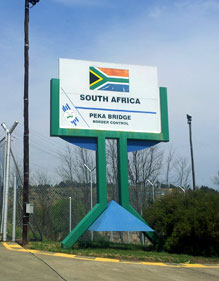|
Getting your Trinity Audio player ready...
|
 Dear Corruption Watch
Dear Corruption Watch
I run a small business that requires some of my employees to drive through border crossings. They are often asked for bribes, but I tell them it is wrong and we should not pay. Last week, late on a Friday, one of my employees called to say he was being threatened with jail if he did not pay. The safety of my employees is paramount, but so is an ethical business. How are we meant to balance these risks?
Courier
Dear Courier,
You are faced with a dilemma that is sadly all too familiar. The safety of your employees is paramount, but, if there is to be an end to the corrupt practices at the borders, travellers must take a firm stance and blow the whistle repeatedly. Remember that all services offered by government officials at border posts are supposed to be free of charge.
Corruption Watch has received a number of reports about corrupt border guards, and the allegations range from bribes to officials who flout regulations, abuse their power and exploit members of the public.
South Africa has more than 60 border posts, shared with Lesotho, Swaziland, Mozambique, Zimbabwe, Botswana and Namibia.
Services at these posts range from security to immigration and customs and excise.
Various government departments staff the borders, including the army, police, SARS, Department of Home Affairs and Department of Public Works.
A border control operational co-ordinating committee is responsible for co-ordinating the activities of the various departments and also for preventing, detecting, investigating and prosecuting cases of corruption at the borders.
The committee has designated anti-corruption co-ordinators in each province and for each port of entry.
When your employees are confronted with bribery and corruption at the border posts, they must make an effort to obtain the names of the guilty officials and report the incidents.
They can report incidents to Corruption Watch on 0800 023 456, or by filing an online complaint.
The incidents should also be reported to the police, the government department in which the guilty border guard or official is employed and the committee coordinator responsible for that port of entry.
The anti-corruption contact numbers are:
- South African Police Service: 0800 010 111;
- South African Revenue Service: 0800 002 870;
- Department of Home Affairs: 0800 601 190; and
- Any other departments: 0800 701 701.
You can find the contact details of the committee coordinator in charge of the each border post on the border control website and on the Corruption Watch website.
To give you and your employees some encouragement, we remind you that in May last year the Free State Hawks and the SAPS arrested nine police officers and six home affairs officials stationed at the Caledons-poort border post with Lesotho for corruption. That followed a police surveillance operation that was initiated after members of the public blew the whistle on the corrupt activities at the border post.
Here are some practical tips for your employees and other travellers to avoid becoming a target of bribery at the border:
- Make sure that all your paperwork is with you. Car papers are important (for example, a letter from the owner or finance house);
- Do not give your passport to all those ‘officials’ flashing badges outside border control;
- Do not pay any money to anyone saying they are there to help you; and
- Have a letter from your motor insurance that the car is covered while outside the country.
• This article was first published in Sunday Times: Business Times




